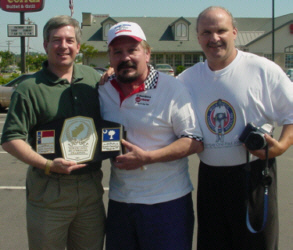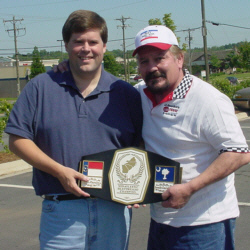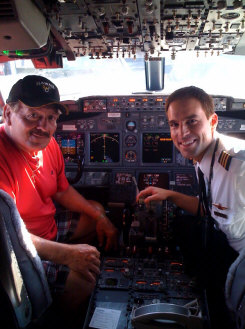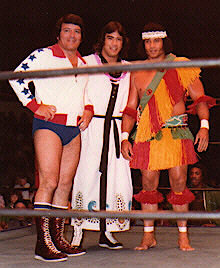|
Part
Four - Reflections
DC: What
were some of your favorite moves. Some of the moves I
remember so well were the football tackles. How did those
come about?
George:
Actually, he learned those from me. (Everyone laughs)
Paul:
Yeah, I went to see George wrestle and I said, oh my
goodness, he's using a football tackle! And then suddenly,
oh no, an airplane spin! What a great idea! So I got it all
from George.
George:
Yeah, it was more like, here's how not to do it.
(laughs) Paul, which came first, the football tackles or the
airplane spin?
Paul: The
airplane spin. But my normal routine was two football
tackles, and then the Indian death lock. And my football
tackles weren't like alot of the ex-football players would
do them..
George:
Like Mosca, he would just run over you...
Paul:
Right, but I would get real low, and run right through. A
funny thing about the football tackles. Old man Crockett,
Crockett, Sr. what a wonderful guy. He was a really big man.
But in the Park Center on Monday nights, in Charlotte,
before the matches would start, he used to walk over to my
dressing room, and he'd walk in and he'd come over to the
bench and sit down next to me and pat me on the leg and say,
"Paul, do those football tackles." He loved them,
and that was kind of special.
DB: Any
ribs you especially remember?
Paul:
There was this guy that was new, and he was so proud of his
new patent leather boots, I can't remember his name, he was
a friend of Bart's and Len Denton's, but we told him that if
he kept those boots in the freezer, they would last longer,
and they guy was putting the boots in his freezer, and
everybody was playing along. That was really funny.
DC: Your
favorite guys to work with in the Mid-Atlantic area?
Paul: Jack
Brisco and Johnny Valentine.
DB: Any
towns you liked working more than others?
Paul:
Those that had a lot of cheeks in the seats. (Laughs) I
liked towns that had good security. And towns that had a
loyal, regular following, an educated audience. Charlotte
Park Center was like that. There was a time when wrestling
was a family thing, and I don't necessarily mean (the
content), I just mean it was something that a guy took his
whole family to see. Week after week. And then his kids
would take their families, and it would continue from
generation to generation. Back then he could afford to do
it. Now, there's no way for alot of families to afford the
tickets for the whole family...
DB: ...and
the parking and the popcorn and the t-shirts. It's the same
with leagues like the NFL. The average family can't afford
to go, at least not regularly.
Paul: And
so what would happen is, as it got so expensive, you were an
a-hole if you went and didn't take your family, but you
couldn't afford to take the family, so you just don't
go.
DB: And
now it's usually just guys and their buddies.
Paul:
That's right. You don't see families anymore.
DC: What
were the programs that were most significant to you in your
career?
Paul: I
guess I would say the tag team with Wahoo against the
Andersons, and the feud with Jimmy Boogie Man Valiant, which
lasted nearly four years. Some of our biggest matches were
actually after I had really retired and was a manager.
DC: What
were the most significant title runs you had?
Paul: In
tags, it would have to have been the World Tag Titles, and
in singles, the US title.
DC: You
had several World Tag title runs, which one?
Paul:
Wahoo and I, against the Andersons.
DB: You
attended the Cauliflower Alley Banquet this year. What was
that like?
Paul: What
a great experience. My son actually talked me into going and
went with me. I had a great time with Brisco and Paul Vachon
(and others). It's something you guys should do. I'm already
looking forward to next year.
DC: Any
last thoughts, things you want your fans to know?
Paul: I
was proud to have been able to work hard when it was a team.
I would drive to the shows, and so would the guy on the
first match, he would drive to the shows. He had the same
trans expenses I had. So if I could work hard and draw a
good house, and work strong returns, and draw money it would
help the whole card. That guy underneath had the same gas
expenses I did, so the big house would help him alot more
than me, I was making good money.
I have no
regrets. I was glad I came through at a time when wrestling
fans, they either loved you or hated you, there was no in
between, they would fight for you, and they would do
anything to protect you, and they looked forward to seeing
you and being a part of your life. Things have changed. When
I first started wrestling there were about 40 territories.
And guys would move from territory and really learn. Today
guys are pushed so hard so quick without learning first. And
these guys work hard, they've been working hard, but the
problem is, what else can they do? What can they do to top
gay wrestlers getting married in the ring, stuff like that,
they've done every weird thing they can think of, and it's
hard to get the crowd anymore. I miss those fans that
lived it with us.
* * * * *


David
Chappell with Paul Jones and George South, Dick Bourne with
Paul Jones.
The
replica Mid-Atlantic Heavyweight title belt was made by Dave
Millican, (DaveMillicanBelts.com
/
(Contact Dave Millican)
Our
special thanks to Paul Jones for his time with us that
Tuesday afternoon in Charlotte, and to our friend George
South for arranging things. We'll look forward to visiting
with Paul again down the road.
©
2003 Mid-Atlantic Wrestling Gateway

No. 1 Paul Jones
in the cockpit of a Delta Airlines jet with his son Paul Jr.
Paul was on his way home from a
vacation in
Puerto Vallarta, Mexico and his son was one of the pilots on the
flight!
Paul, who lives in
the Atlanta area, sends greetings to all his fans and wants everyone
to know he's doing great.

Paul Jones, Ricky Steamboat, and Jimmy
Snuka (circa 1979)
Return
to the Mid-Atlantic Gateway lobby
|